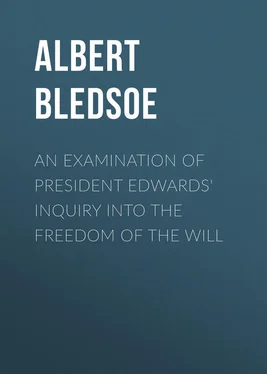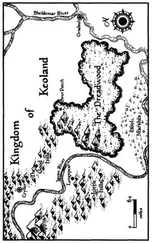Albert Bledsoe - An Examination of President Edwards' Inquiry into the Freedom of the Will
Здесь есть возможность читать онлайн «Albert Bledsoe - An Examination of President Edwards' Inquiry into the Freedom of the Will» — ознакомительный отрывок электронной книги совершенно бесплатно, а после прочтения отрывка купить полную версию. В некоторых случаях можно слушать аудио, скачать через торрент в формате fb2 и присутствует краткое содержание. ISBN: , Издательство: Иностранный паблик, Жанр: foreign_antique, foreign_prose, на английском языке. Описание произведения, (предисловие) а так же отзывы посетителей доступны на портале библиотеки ЛибКат.
- Название:An Examination of President Edwards' Inquiry into the Freedom of the Will
- Автор:
- Издательство:Иностранный паблик
- Жанр:
- Год:неизвестен
- ISBN:http://www.gutenberg.org/ebooks/35839
- Рейтинг книги:4 / 5. Голосов: 1
-
Избранное:Добавить в избранное
- Отзывы:
-
Ваша оценка:
- 80
- 1
- 2
- 3
- 4
- 5
An Examination of President Edwards' Inquiry into the Freedom of the Will: краткое содержание, описание и аннотация
Предлагаем к чтению аннотацию, описание, краткое содержание или предисловие (зависит от того, что написал сам автор книги «An Examination of President Edwards' Inquiry into the Freedom of the Will»). Если вы не нашли необходимую информацию о книге — напишите в комментариях, мы постараемся отыскать её.
An Examination of President Edwards' Inquiry into the Freedom of the Will — читать онлайн ознакомительный отрывок
Ниже представлен текст книги, разбитый по страницам. Система сохранения места последней прочитанной страницы, позволяет с удобством читать онлайн бесплатно книгу «An Examination of President Edwards' Inquiry into the Freedom of the Will», без необходимости каждый раз заново искать на чём Вы остановились. Поставьте закладку, и сможете в любой момент перейти на страницу, на которой закончили чтение.
Интервал:
Закладка:
He has, we are told, “very particularly informed us in what sense he uses the word cause,” p. 64. Now is this so? Has he informed us that by cause he means occasion? He has done no such thing, and his language admits of no such construction. He merely tells us, that he sometimes uses the term cause to signify an occasion only; but when and where he so employs it, he has not explained at all. He has not once said, that when he applies it to motive he uses it in the sense of an occasion, or antecedent; and, if he had said so, it would not have been true. The truth is, that he has used the word in question with no little vagueness and indistinctness of meaning; for he sometimes employs it to signify merely an occasion, which exerts no positive influence, and sometimes to signify a producing cause. This is the manner in which he uses it, when he applies it to motive. In his definition of motive, as the younger Edwards truly says, he includes “ every cause or occasion of volition;” every thing which has a “tendency to volition;” &c., p. 104. Thus, according to the younger Edwards himself, the elder Edwards has, in his definition of motive, included every conceivable cause of volition; and yet, when Dr. West objects that he makes motive the producing cause of volition, the very same writer replies that he has done no such thing: that he has “very particularly explained in what sense he uses the word cause” when applied to motive, and that he means “by cause , no other than occasion, reason, or previous circumstance necessary for volition ; and that in this Dr. West entirely agrees with him,” p. 65. If we may believe the younger Edwards, then, when the author of the Inquiry says, that motive is the cause of volition, he means that it is no other than the occasion or previous circumstance necessary to volition, and not that it is the cause thereof in the proper sense of the word; and yet that it is the cause thereof in every conceivable sense of the word! Now, he agrees with Dr. West himself; and again, he teaches precisely the opposite doctrine! Let those who so fondly imagine that they are the only men who understand the Inquiry, and that the most elaborate replies to it may be sufficiently refuted by raising the cry of “misconstruction;” let them, I say, take some little pains to understand the work for themselves, instead of merely giving echo to the blunders of the younger Edwards.
President Edwards says, that the term cause is often used in so restrained a sense as to signify that which has “a positive efficiency or influence to produce a thing, or bring it to pass.” It is in this restrained sense that I use the word, when I say that President Edwards regarded motive as the cause of volition; and it is in this sense that I intend to make the charge good. I intend to show that he regarded motive, not merely as the occasion or condition of volition, but as that which produces it. This position, as we have seen, has been denied by high authority; and therefore it becomes necessary to establish it, in order that I may not be charged with disputing only about words; and that although I may be exceedingly “desirous of being thought to differ with President Edwards” on this subject, yet I do “most exactly agree with him.”
To begin then; – if motive is merely the condition on which the mind acts, and exerts no influence in the production of volition, it is certainly improper to say, that it gives rise to volition . This clearly implies that it is the efficient, or producing cause of volition. On this point, let the younger Edwards himself be the judge. “That self-determination gives rise to volition,” is an expression which he quotes from Dr. Chauncey, and italicizes the words “gives rise to,” as showing that the author of them regarded the mind as the efficient cause of volition. Now, President Edwards says, that the “strongest motive excites the mind to volition;” and he adds, that “the notion of exciting, is exerting influence to cause the effect to arise and come forth into existence ,” p. 96. Surely, if to give rise to a thing, is efficiently to cause it, no less can be said of exerting influence “to cause it to arise and come forth into existence .” And if so, then, according to the younger Edwards himself, the author of the Inquiry regarded motive as the efficient cause of volition; and yet, on p. 66 he declares, that President Edwards did not hold “motive to be the efficient cause of volition;” and that if he has dropped any expression which implies such a doctrine, it must have been an inadvertency. I intend to show, before I have done, that there are many such inadvertencies in his work; the younger Edwards himself being the judge.
Now, it will not be denied, that that which produces a thing, is its efficient cause. The younger Edwards himself has spoken of an “ efficient, producing cause,” in such a manner as to show that he regarded them as convertible terms, p. 46. He being judge, then, that which produces a thing, is its efficient cause. I might easily show, if it were necessary, that he himself frequently speaks of motive as the efficient, or producing cause of volition; but, at present, I am only concerned with the doctrine of President Edwards. “It is true,” says President Edwards, “I find myself possessed of my volitions before I can see the effectual power of any cause to produce them, for the power and efficacy of the cause is not seen but by the effect,” p. 277. Here, from the volition, from the effect, he infers the operation of the cause or power which produces it. Now this cause is motive, the strongest motive; for this is that which operates to induce a choice. Motive, then, produces volition, according to the Inquiry; it is not merely the condition on which it is produced.
The younger Edwards declares, that President Edwards did not regard “motive as the efficient cause of volition,” p. 66, but only as the “occasion or previous circumstances necessary to volition;” in this respect “most exactly agreeing with Dr. West” himself; and yet he tells us, in another place, that “every cause of volition is included in President Edwards’ definition of motive,” p. 104. Now, does not every cause of volition include the efficient cause thereof? Does not this expression include that which is the cause of volition in the real, in the only proper, sense of the word?
To save the consistency of the author, will it be said, that “every cause” does not include the efficient cause in his estimation, since in his opinion there is no such cause? If this should be said, it would not be true; for the younger Edwards did, as it is well known, regard the influence of the Divine Being as the efficient cause of volition. He regarded the Deity as the sole fountain of all efficiency in heaven and in earth. Hence, if the definition of President Edwards included “every cause” of volition; it must have included this divine influence, this efficient cause. Indeed, the younger Edwards expressly asserts, that this “divine influence” is included in President Edwards’ “explanation of his idea of motive,” p. 104. He tells us, then, that President Edwards regards motive as merely the occasion of volition; and yet that he considered motive as including the efficient cause of volition! At one time, motive is merely the antecedent, which exerts no influence; at another, it embraces the efficient cause! At one time, the author of the Inquiry “most exactly agrees” with the libertarian in regard to this all-important point; and, at another, he most perfectly disagrees with him! It is to be hoped, that President Edwards is not quite so glaringly inconsistent with himself, on this subject, as he is represented to be by his distinguished son.
Читать дальшеИнтервал:
Закладка:
Похожие книги на «An Examination of President Edwards' Inquiry into the Freedom of the Will»
Представляем Вашему вниманию похожие книги на «An Examination of President Edwards' Inquiry into the Freedom of the Will» списком для выбора. Мы отобрали схожую по названию и смыслу литературу в надежде предоставить читателям больше вариантов отыскать новые, интересные, ещё непрочитанные произведения.
Обсуждение, отзывы о книге «An Examination of President Edwards' Inquiry into the Freedom of the Will» и просто собственные мнения читателей. Оставьте ваши комментарии, напишите, что Вы думаете о произведении, его смысле или главных героях. Укажите что конкретно понравилось, а что нет, и почему Вы так считаете.












